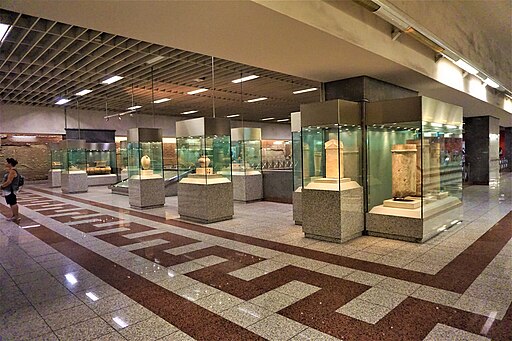The Syntagma Metro Station Archeological Collection is a museum in Athens, Greece. It is free and is located at the Syntagma station of the Athens Metro. The collection features a variety of historical items unearthed during the process of building the underground metro train system.
A Tour of the Syntagma Metro Station Archaeological Collection
- Archaeological Section
- Ionic Capital 4th Century BC
- Pithos with Lid – 3rd Century BC
- Marble Loutrophoros – 4th Century BC
- Syntagma Metro Station Archaeological Tour
Ionic Capital 4th Century BC – Strategy Game Table

Ionic Capital 4th Century BC – Strategy Game Table
This Ionic Column Capital dates from the 4th Century BC when it probably graced an Athenian temple. At a much later date, after the temple had been destroyed, the Capital was used as a strategy game table. On the top of the marble was carved the inscription of the gameboard pattern.

The Ionic Capital and Column are one of the three classical orders of classical architecture, the other two orders being the Doric and the Corinthian. The Ionic capital is characterized by the use of volutes – the spiral, the scroll-like ornament that forms the basis of the Ionic order.
The Ionic columns usually stand on a base which separates the shaft of the column from the platform. The Ionic order originated in the mid-6th century BC in Ionia, the southwestern coastland and islands of Asia Minor settled by Ionian Greeks. The Ionic order Capital and Column became common in mainland Greece by the 5th century BC.
Nine Men’s Morris – Strategy Game
The carved pattern looks very much like the strategy game with the modern name of “Nine Men’s Morris, a strategy board game for two players dating at least to the Roman Empire. Nine men’s morris is a solved game in which either player can force the game into a draw. Its name derives from the Latin word merellus or ‘game piece.’
Ionic Capital 4th Century BC – Strategy Game Table
- Name: Ionic Capital
- Date: 4th Century BC
- Material: Marble
- Country: Greece
- Museum: Syntagma Metro Station Archaeological Collection
Pithos with Lid 3rd Century BC
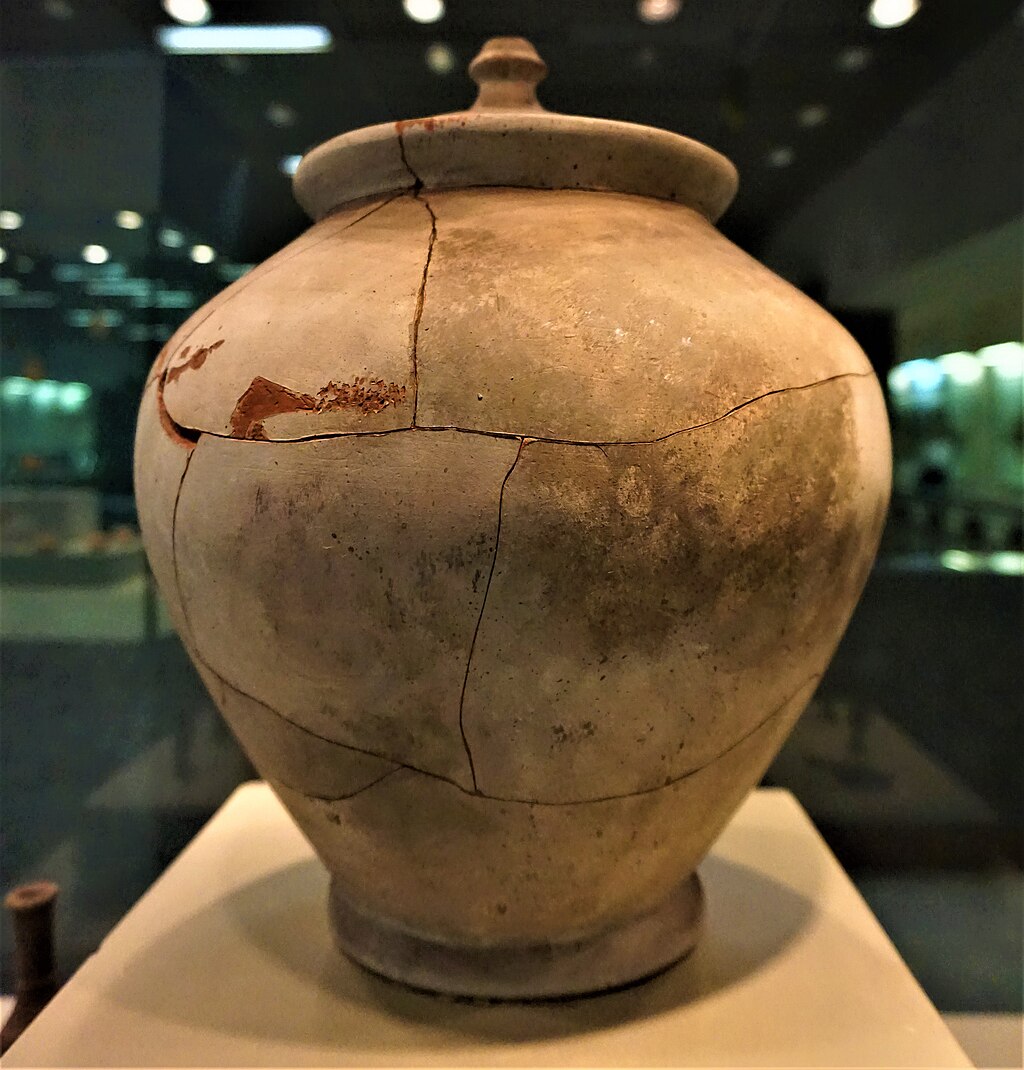
Pithos with Lid 3rd Century BC
This pithos with lid, from the 3rd century BC, is a large storage container. The term Pithos is applied to such containers used among the civilizations that bordered the Mediterranean Sea. Pithoi had been used for the storage of fluids and grains and are comparable in use to the drums, barrels, and casks of recent times.
Pithoi were manufactured and exported or imported over the entire Mediterranean. They were used for storing or shipping of wine, olive oil, or various types of vegetable products. The term has been adopted into the English language as a general word for a storage jar from any culture. This naming practice of pre-classical pottery types with classical types has long been a challenge for archaeology.
Pithos with Lid
- Name: Pithos with Lid
- Date: 3rd Century BC
- Material: Terracotta
- Country: Greece
- Museum: Syntagma Metro Station Archaeological Collection
Marble Loutrophoros – 4th Century BC

Marble Loutrophoros – 4th Century BC
This marble loutrophoros from the 4th Century BC marked an Ancient Greek grave. The solid stone loutrophoros is a motif for Greek tombstones, either as a relief or as a stone vessel. There were many in the ancient funeral area of Athens, some of which are now preserved in various museums of Athens. This loutrophoros with an inscription has survived for over 2,000 years.
A loutrophoros which in English translation means “bathwater” and “carry” started is evolution as a distinctive type of Greek pottery vessel characterized by an elongated neck with two handles. The loutrophoros was used to carry water for a bride’s prenuptial ritual bath, and in funeral rituals, and was placed in the tombs of the unmarried. In its long history, it evolved from a pottery vessel to a tombstone motif in the ancient Greek culture.
Marble Loutrophoros – 4th Century BC
- Name: Loutrophoros
- Date: 4th Century BC
- Material: Marble
- Country: Greece
- Museum: Syntagma Metro Station Archaeological Collection
Archaeological Section
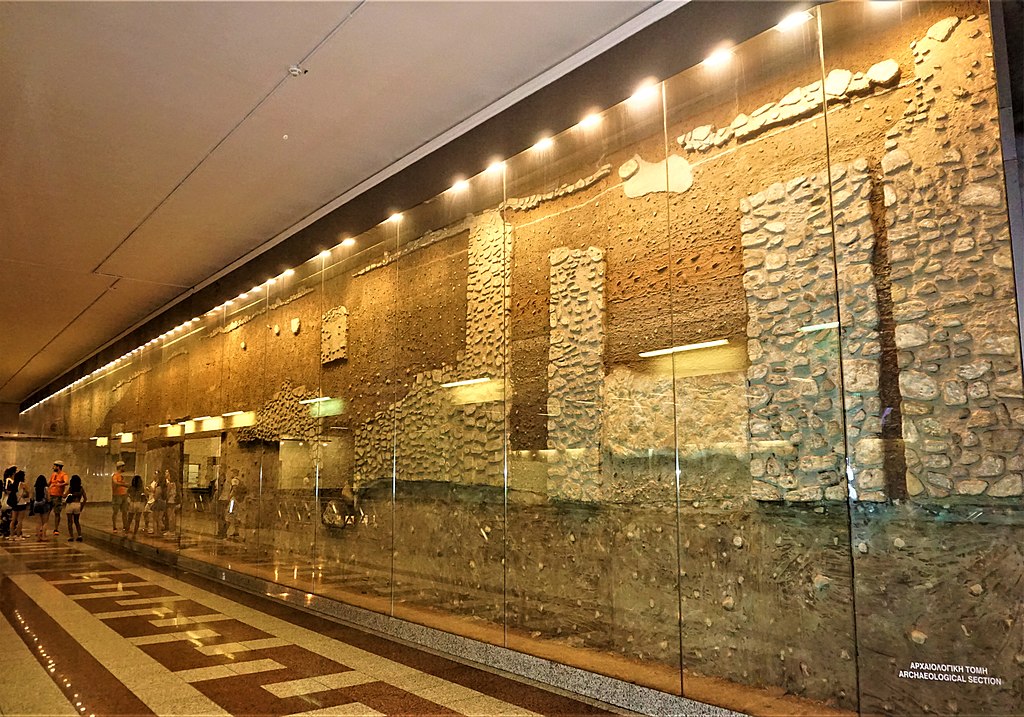
Archaeological Section
This Archaeological Section is a view of the archaeological sequence showing it in the vertical plane, as a cross-section. This exhibit illustrates the profile and stratigraphy of what was discovered in the excavations for the Syntagma Metro Station. This archaeological approach makes it easier to view and interpret what developed at this location over time.
Key highlights in this Archaeological Section include:
- Cistern from the Ottoman Period
- Early Christian Grave
- Road foundations to Mesogaia
- Pit of the “Peisistratid” Aqueduct
- Grave from the 4th Century BC
- Eridanos River Bed
Archaeological Section
- Name: Archaeological Section
- Date: 4th Century BC to 1800s
- Material: Marble
- Country: Greece
- Museum: Syntagma Metro Station Archaeological Collection

Marble Grave-stone (Roman Period)

Marble Grave-stone (Early Roman Period)

Unguentaria – Perfume Vessels, 2nd Century BC

Clay Lamp 6th Century AD

Wine Amphorae, 2nd Century BC

Terracotta Pipes of the Pisistradid Aqueduct, 1st – 5th Century BC

Mosaic Floor 4th Century AD
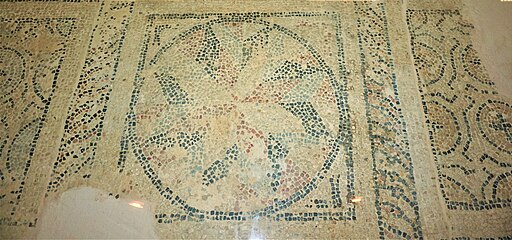
Loom Weights, 1st Century BC

Beehive Box, 1st Century BC

Syntagma Metro Station Archaeological Collection
- Museum: Syntagma Metro Station Archaeological Collection
- City: Athens
- Country: Greece
- Location: Syntagma Metro Station, Athens, Greece
Explore Museums and Historical Sites in Greece
Museums in Athens
- Acropolis Museum
- National Archaeological Museum
- Benaki Museum
- Goulandris Museum of Cycladic Art
- Byzantine and Christian Museum
- Hellenic Motor Museum
- National Historical Museum, Athens
- Museum of the Ancient Agora
- Syntagma Metro Station Archaeological Collection
- Numismatic Museum of Athens
- Athens War Museum
- Jewish Museum of Greece
- Athens University Museum
Athens Historical Sites
- Acropolis of Athens
- Ancient Agora of Athens
- Temple of Olympian Zeus, Athens
- Tomb of the Unknown Soldier, Athens
- Roman Agora
- Temple of Poseidon at Sounion
- Temple of Hephaestus
- Roman Baths, Athens
- Aristotle’s Lyceum
Thessaloniki Museums
- Archaeological Museum of Thessaloniki
- Museum for the Macedonian Struggle (Thessaloniki)
- Atatürk Museum
- War Museum of Thessaloniki
Thessaloniki Historical Sites
- Roman
- Triumphal Arch of Galerius
- Early Christian and Byzantine Monuments
- Catacombs of St. John the Baptist
- Church of Metamorphosis tou Sotiros
- Church of the Acheiropoietos
- Ottoman
- Bey Hamam
- Bezesteni Market
- White Tower of Thessaloniki
Delphi Museums and Historical Sites
- Delphi Archaeological Museum
Delphi Historical Sites
- Athena Pronaia Sanctuary
- Archaeological Site of Delphi
- Temple of Apollo (Delphi)
- Athenian Treasury
- Stoa of the Athenians
- Theatre at Delphi
- Tholos of Delphi
- Manumission Inscriptions at Delphi
- Delphic Maxims
Delos Museums and Historical Sites
- Archaeological Museum of Delos
Santorini Museums
- Akrotiri Archaeological Site
Olympia Museums and Historical Sites
- Archaeological Museum of Olympia
- Museum of the History of the Olympic Games of Antiquity
- Olympia Archaeological Site
Corinth Museums
- Archaeological Museum of Ancient Corinth
Corinth Historical Sites
- Temple of Apollo, Corinth
- Archaeological Site of Ancient Corinth
- Acrocorinth
- Corinth – Photo Gallery
Mycenae Museum and Historic Site
- Archaeological Museum of Mycenae
- Lion Gate
- Ancient Mycenae – Photo Gallery
Epidaurus Museum & Historic Site
- Archaeological Museum of Epidaurus
Heraklion, Crete Museums
- Archaeological Musem of Heraklion
Meteora Museums
- Meteora Monasteries
Milos Museums
- Milos Historical Sites
Mystras Museums
- Fortified Medieval Mystras
Pella Museums
- Archaeological Museum of Pella
Greece
- Country: Greece or the Hellenic Republic
- Greek: Ελληνική Δημοκρατία
- Capital: Athens
- Official languages: Greek
- Population 11.2 million
Greek Proverbs and Quotes
- Greek Proverbs and Quotes
~~~
“Time is the wisest counselor of all.”
– Pericles
~~~
Photo Credit: JOM
Popular this Week

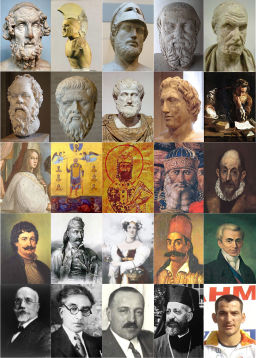






 Sponsor your Favorite Page
Sponsor your Favorite Page SEARCH Search for: Search Follow UsJoin – The JOM Membership Program
Sponsor a Masterpiece with YOUR NAME CHOICE for $5
Share this:
- Tweet

